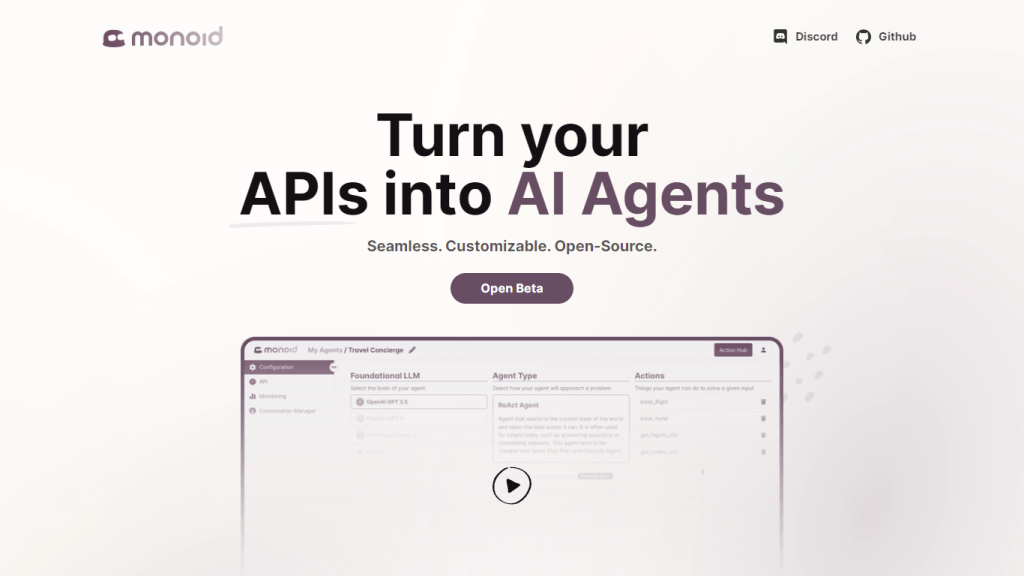What is Monoid?
Monoid is an open-source AI platform that enables Large Language Models to execute actions through API integrations seamlessly. Monoid strengthens and extends the context of LLMs, making AI agents act better and in real-time on behalf of the users. This new tool thus aspired to cope with common challenges of LLMs: contextless and not reactive increasingly in real time.
Monoid is under development to make making AI agents easy, meaning any user can build an AI agent in minutes. It will do this by aggregating foundational LLMs, agent types, with their corresponding desired actions that a user can combine to build, test, and run AI agents in no time. On top of that is the chat agent feature that provides natural language interactions with your AI agents, and the further encouragement of community interaction via its Hub, by which a user can share his Actions and Agents.
Key Features and Benefits of Monoid
- Customizable LLM context for better performance.
- The simple onboarding of AI agents through the selection of foundational LLMs, agent types, and actions.
- Simulate the AI agents’ actions that they undertake in natural language, provided for testing.
- Allow chat agents to interact with the users through various actions.
- Support the development of API-driven actions for real-time AI response.
- Community engagement by sharing and discovering Actions and Agents on the Monoid Hub.
These help make the application more operationally efficient, impact customer satisfaction in a positive way, and optimize workflows. Monoid offers specifically the leading edges of open-source nature, ease of setup, and the strength of customization.
Monoid Use Cases and Applications
The applicability of Monoid cuts across a wide variety of industries and cases. Here are some specific examples:
-
Virtual Shopping Assistants:
By integrating multiple e-commerce APIs, Monoid can help in developing virtual shopping assistants that can provide live updates about its recommendation on products, order tracking, and a user-centric shopping experience. -
Customer Support:
Deploy AI chat agents built with Monoid for common inquiries and instant responses; escalate complex ones to human agents to maintain a high level of customer satisfaction. -
Workflow Automation:
AI agents can be developed to ensure monotony elimination, such as data entry, file management, and report generation, to save precious time and enhance overall efficiency.
How to Use Monoid
Monoid is simple to set up and use. Here are the steps to follow:
- Select an LLM that would form the base in your project.
- Define agent type use case for intended use.
- Define necessary actions, in terms of integrating relevant APIs.
This will simulate and test the actions that the AI Agent will execute based on natural language queries. You can use the chat feature to interact with your AI Agent at the runtime of the application. For good practices, make sure your API parameters are correctly set and test the performance of your AI agents at regular intervals to fine-tune their actions for better performance. The UI is user-friendly and hence self-explanatory, so one can comfortably navigate and set things up fast.
How Monoid Works
Monoid works through APIs, converting the given action into executable actions that we understand and execute through LLMs. It does the operation by:
- Facilitation of customization of LLM in generating context through proper and relevant information and parameters.
- Integrating APIs to define the possible range of actions that can be formulated and executed by the AI agent.
- Mimicking the actions for responses as natural language queries for accuracy and efficacy.
It allows real-time interactions through a chat agent and hence can communicate as seamlessly as possible with AI agents. At the back end, complex algorithms and models will be part of the system that will be used to power the seamless execution of API-driven actions. This will enable AI agents to act autonomously and effectively.
Pros and Cons of Monoid
Just like any tool created by man, Monoid is not curated in a perfect way and surely has its set of pros and some probable cons. These are as follows:
Pros
- Open-source platform allowing for comprehensive customization and community collaboration.
- Quick and easy setup process for AI agent creation.
- LLMs enriched with Real-time actionability.
- Use-cases possible across multiple industries.
- Large community interaction via the Monoid Hub.
Potential Concerns
- Needs some level of tech knowledge to set up API configurations properly.
- Possibly limiting based on the complexity of the actions.
One of the most obvious strengths of Monoid reported in many user reviews is its ease of use and efficiency in managing all types of applications. Although it was said that there should be more elaborative documentation to aid advanced configurations.
Monoid FAQs
-
What is Monoid?
Monoid can turn APIs into Actions. This framework therefore gives LLMs the ability to do many things on behalf of users. -
How do I design an AI Agent with Monoid?
One is able to design an AI Agent by Monoid by selection of a foundational LLM, an agent type, and definition of the necessary Actions. -
Is Monoid open source?
Yes. The Monoid is an open-source system crafted to be customized and improved by developers. -
What use cases does Monoid support?
Monoid caters to a wide array of business needs—shopping assistant, customer support, and automating workflows, among others. -
Can I test what my AI Agent will do in Monoid?
Yes, you can test your Agent by simulating an AI Agent with your API in response to natural language queries.










